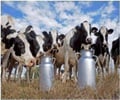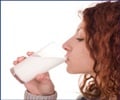Networks of baby formula traffickers are shipping milk powder to Chinese parents who fear local products are not safe.

Even the Chinese buyers are complaining. "Its getting harder to find milk powder, for each box I have to walk further," said a woman surnamed Shao, who lives in Germany and advertises baby formula online.
She is one of a small army of vendors working from homes across Europe, emptying shelves and causing shops to impose limits on purchases.
China's equivalent of eBay, Taobao, has more than 4,000 listings for milk powder products from Germany, with a similar number from Britain and nearly 3,000 from France.
"I started off sending the powder to family and friends," said Shao, a stay-at-home mother who says she makes a "small amount" from the business.
"Mothers usually order six to eight boxes at a time, because it takes a month to arrive and they want to keep a constant supply," she told AFP.
Advertisement
Demand is driven by memories of a 2008 scandal over Chinese baby formula tainted with the industrial chemical melamine which killed six children and affected more than 300,000 others.
Breastfeeding rates in China are low -- only 28 percent according to a 2012 UNICEF report -- due to time limits on maternity leave and aggressive marketing of formula.
But buyers are sceptical of any products sold in China, including foreign brands packaged for the Chinese market.
China is "by far" the world's largest market for formula, says consumer research group Euromonitor.
"Chinese young parents perceive international brands, especially imported brands in original packaging, to be healthier," said analyst Vera Wang.
The Chinese websites charge hefty mark-ups, sometimes approaching 100 percent, on the retail price, such as German brand Aptamil advertised at around 220 yuan ($35) for a 600g (21 ounce) box.
Shipping fees can double those prices again, while customs checks and import duties in China can add another 30 percent, according to Chinese reports.
In contrast, a central Beijing supermarket sells Chinese-made Yili formula at 150 yuan for 900g.
The rising Chinese demand has led to shortages across Europe.
One German exporter posted a picture of empty supermarket shelves online writing: "I counted with the shop manager, there were eight metres of empty shelves... all bought by Chinese people."
German media have seized on photos of shop shelves stripped bare, with Bild, Europe's highest circulation newspaper, announcing in January: "Angry mothers stand in front of empty Aptamil shelves... because Chinese buy up our milk powder!"
Milupa, which makes Aptamil, apologised for the shortages, citing "exports to Asia" as the reason.
"We don't encourage these exports and we don't sell to Asia. These customers buy directly from German supermarkets," it said on its website.
Closer to mainland China, anger about visitor purchases in Hong Kong saw the city ban travellers taking out more than 1.8 kilograms of formula, with banners at the border warning of HK$500,000 (US$64,000) fines and two-year jail sentences for offenders.
European stores have also begun to limit sales, with German pharmacy chain DM banning customers from buying more than three boxes of Aptamil at a time.
In Britain, major supermarket chains are reportedly limiting customers to two cans of formula per day at manufacturers' requests, with Milupa's parent company Danone saying the move was to prevent bulk-buying for "unofficial exports to China".
A Chinese customer was recently forced out of a branch of a British supermarket after staff said he had bought more than 100 boxes of formula in a single week, according to the 21st Century Business Herald, a Chinese newspaper.
In Australia, a major run on Karicare formula reportedly linked to an influx of Chinese tourists over Christmas saw some supermarkets and pharmacies introduce rationing and purchase limits in January.
In Germany, a vendor based near Frankfurt echoed others across the country when he told AFP: "It's becoming much harder to buy milk powder. Last time I went shopping I could only buy 12 boxes, so I've stopped trading."
But Shao said the shortages and restrictions would not stop her.
"If one supermarket is sold out, I'll walk to another," she said. "I do it for the mothers, and for the children. As a mother myself, I know how important milk powder is."
Source-AFP










